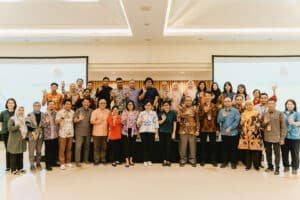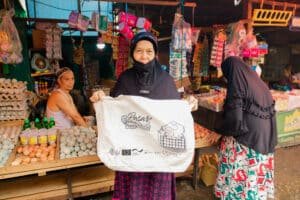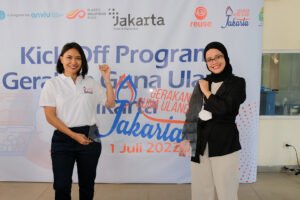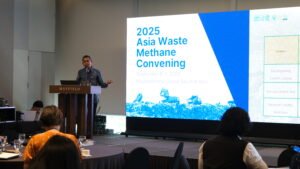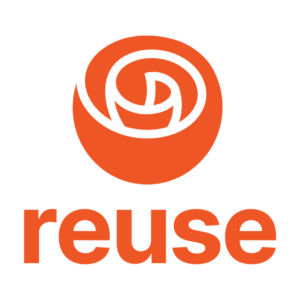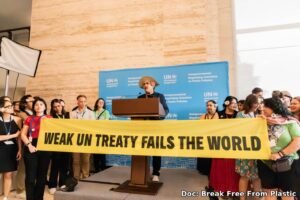Citraland Fresh Market Towards a Plastic-Free Market
By: Surabaya Zero Waste Community
The waste problem in Indonesia, especially in Surabaya, is a problem that has just been resolved. With the continued increase in population and trading industry, the volume of waste generated also increases. The composition of waste produced from human activities is 60-70% organic waste, and the remainder is 30-40% non-organic waste. Of the non-organic waste, the second largest composition is plastic waste. The most plastic waste is plastic bags or plastic bags apart from plastic packaging.
Jambeck (2015) stated that Indonesia is ranked second worldwide after China for producing 187.2 tonnes of plastic waste in the waters. This is related to data from the Ministry of Environment and Forestry, which states that the plastic made by 100 shops or members of the Indonesian Retail Entrepreneurs Association (APRINDO) in just one year has reached 10.95 million pieces of plastic bag waste. This amount is equivalent to an area of 65.7 hectares of plastic bags.
Based on the problems above, the Surabaya Zero Waste Community, together with the Indonesian Plastic Bag Diet Movement (GIDKP) in collaboration with the Citraland Surabaya Fresh-Market market manager and supported by the Canadian Embassy through the Canada Fund for Local Initiative (CFLI) are carrying out Plastic Free Market activities. The Plastic Free Market Program is Surabaya’s first plastic-free pilot market trial. Citraland Fresh Market is one of the hundreds of markets in Surabaya. This market is managed professionally by the Citraland developer, as evidenced by the neat, clean, and beautiful market conditions.
This plastic-free market program begins with basic research activities, namely baseline research targeting traders as respondents and Focus Group Discussions (FGD). This FGD is intended so that traders and related parties around the market area are also invited and involved to find out what problems, ideas, and alternative solutions can be implemented so that the trial of the plastic-free market program at the Citraland Fresh Market can be successful.

This primary research aims to describe the willingness of Citraland Fresh Market traders to reduce the production of single-use plastic waste. Baseline research was conducted from 9 August to 5 September 2021. The data obtained in this basic research included the consumption of large plastic bags issued by traders, which reached 964 per day, and 3,005 pieces for small plastic bags. In addition, 75% of traders agree or are willing to reduce single-use plastic consumption in their kiosks. Furthermore, only 24.6% of traders felt that they often saw market visitors carrying their shopping bags when shopping.

Thirty-five people attended the FGD activity as participants, including trader representatives, Surabaya City Cleanliness and Green Open Space Service representatives, market managers, and various other parties. The results of the FGD are that there is a need to educate buyers regarding bringing their reusable bags when shopping, provide waste sorting stations in the market area, have written rules from market managers, and break the myth that has developed in Surabaya society regarding the use of plastic bags.
“…..”, said….
This program will run until February 2022 to trial a plastic-free market model. By carrying out this basic research in the Citraland Fresh Market, the data obtained can be used as a primary basis for follow-up through campaigns and outreach to market traders and consumers. Of course, this plastic-free market program can be right on target.

